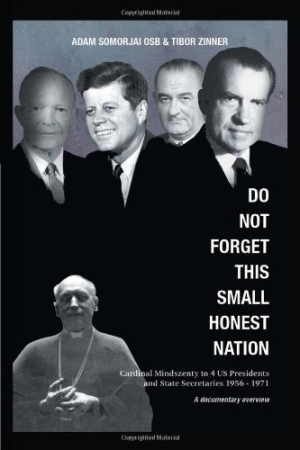Do Not Forget This Small Honest Nation
Cardinal Mindszenty to 4 US Presidents and State Secretaries 1956-1971
The Catholic Church gets so much bad press these days that this epistolary biography of Cardinal Mindszenty, a Hungarian priest who dedicated his life to advocating for religious freedom behind the Iron Curtain, will come as a welcome affirmation of the Church’s potential for good.
“A symbol of anticommunism,” the cardinal spent fifteen years in political asylum at the American Legation in Budapest, writing persistently and eloquently to American presidents Eisenhower, Kennedy, Johnson, and Nixon about the repression of Hungarians under the Soviet regime.
Most Americans know little about events behind the Iron Curtain during the 1950s and 1960s. Eastern Europe was “lost” in the minds of the American government after an agreement struck at the post-WWII Yalta Conference ceded much of Central Europe, including Hungary, to the Soviet Union under Stalin. Religion was violently suppressed—Budapest’s largest church was destroyed and replaced with an outsize statue of Stalin. Cardinal Mindszenty, the Prince Primate of Hungary and Archbishop of Estztergom, was his country’s highest ranking cleric and therefore a serious threat to the collaborationist Kadar regime.
Mindszenty, freed from a Soviet prison for only three days when tanks rolled into Budapest to quell a brief rebellion, sought refuge in the American Legation, fearing for his life. He wrote his first letter to President Eisenhower in 1956, thanking him for granting asylum and begging, “Do not forget this small honest nation who [sic] is enduring torture and death in the service of humanity.” According to Mindszenty, although Eisenhower “indicated clearly how he felt about the brutality visited on these people,” he decided against responding to it, thus establishing a fifteen-year policy under which the cardinal would get only oral acknowledgment that his letters had been received. Undeterred, the cardinal continued to write on the behalf of his fellow Hungarians.
Later letters detail the high rates of alcoholism and state-sponsored abortion in Hungary. Except for one letter from America’s first Catholic president, John F. Kennedy, in 1961, and one from President Nixon in 1971, the cardinal’s letters were never answered. Nevertheless, his letters remain a trove of information about the persecutions inflicted on the Hungarian people and the character of one man who spent fifteen years advocating for their relief.
The book is organized chronologically, with a brief introduction and short sections of commentary summarizing Mindszenty’s convictions and the lack of access he had, especially early in his stay, to accurate information regarding events in Hungary. There are also reproductions of internal State Department memorandums, especially from the beginning of each new president’s term. The editors of this collection make clear that since the State Department felt unable to provide the intervention or assistance Mindszenty requested for his people, the official policy of only acknowledging their receipt orally without any discussion of their substance was delegated to lower-ranking officials as the years passed. The book concludes with a glossary of the dates of the cardinal’s letters, categorized according to the American presidential administration to which they were addressed.
Despite their occasional repetitiveness—since Mindszenty received few and unsatisfying responses—his letters reveal a passionate and keen mind, an astonishing command of history and worldwide events, and a great sense of mission. This book will be of great interest to historians of Hungary, the Cold War, and the Catholic Church because it reveals the quality of Mindszenty’s mind and the depth of his faith during a long, difficult trial.
Reviewed by
Elizabeth Breau
Disclosure: This article is not an endorsement, but a review. The publisher of this book provided free copies of the book and paid a small fee to have their book reviewed by a professional reviewer. Foreword Reviews and Clarion Reviews make no guarantee that the publisher will receive a positive review. Foreword Magazine, Inc. is disclosing this in accordance with the Federal Trade Commission’s 16 CFR, Part 255.

